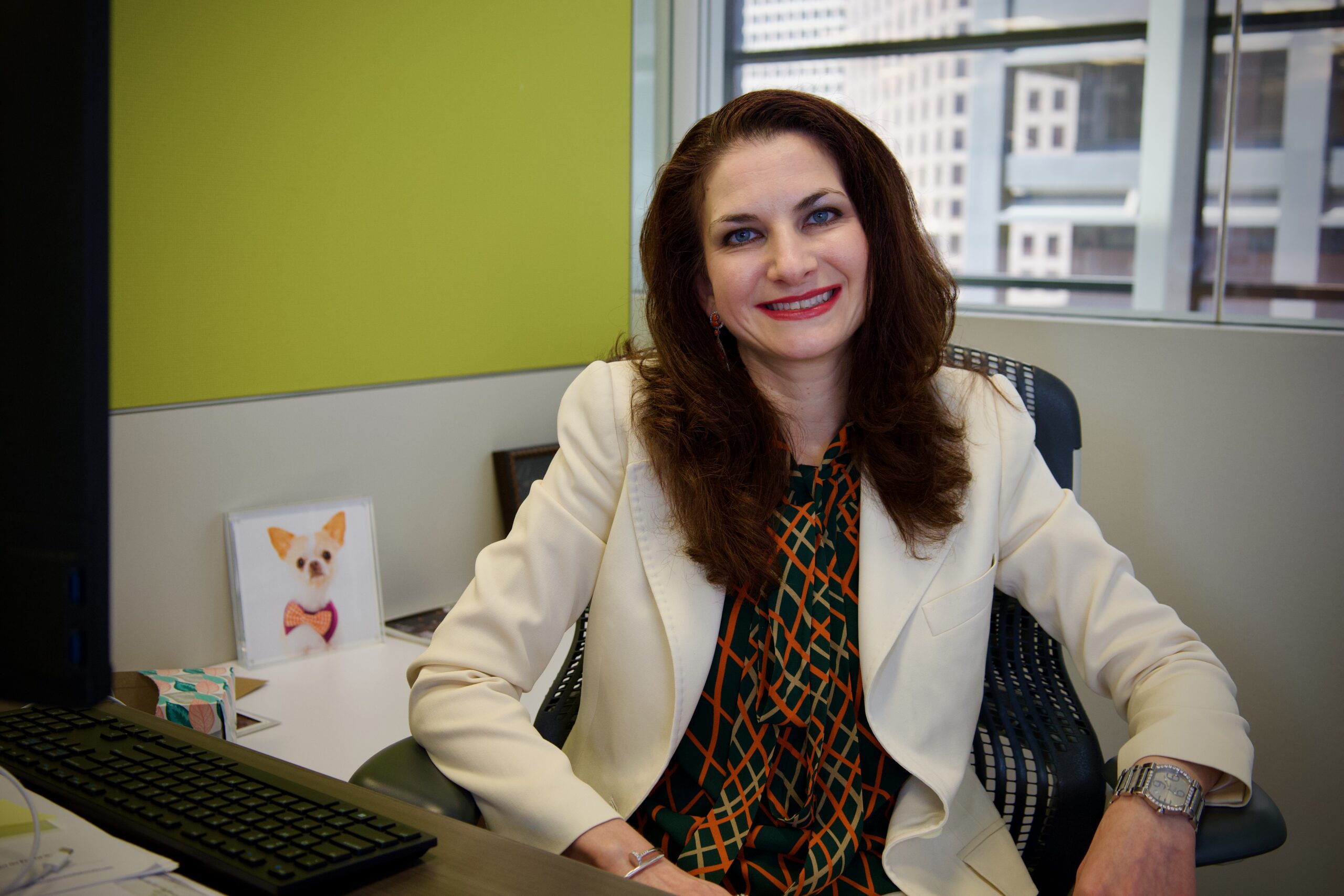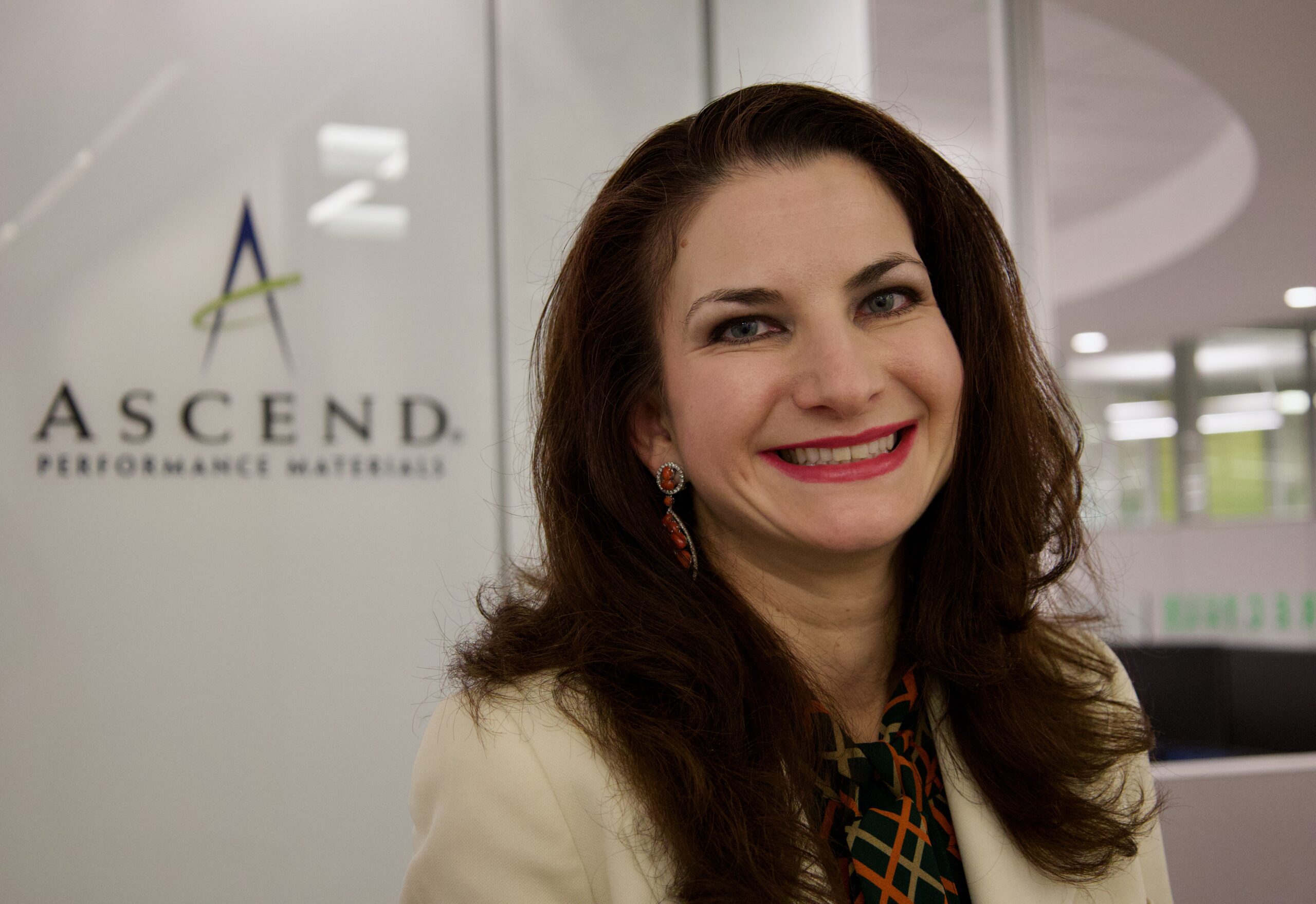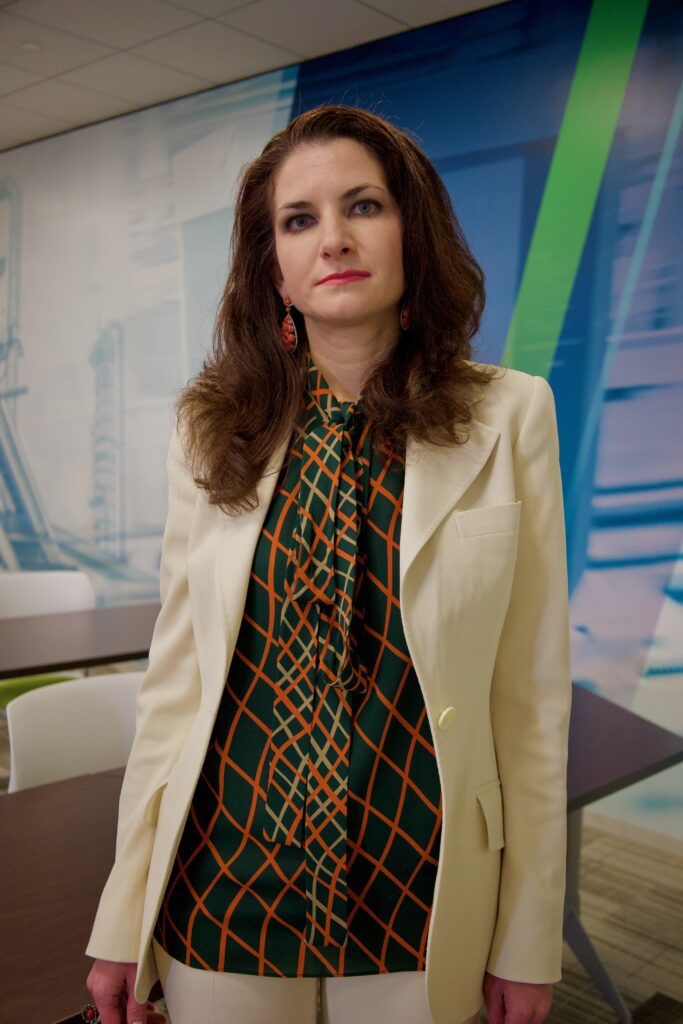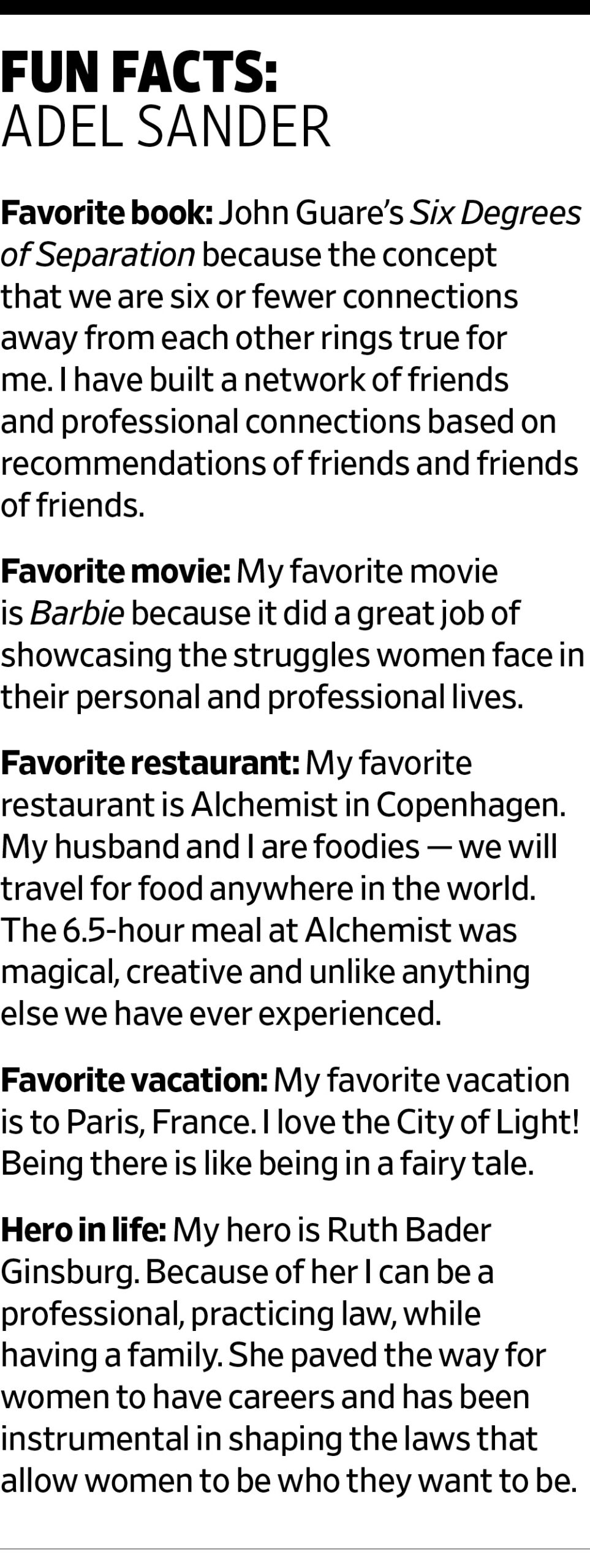As a labor and employment associate in 2010, Adel Sander witnessed the backlash a colleague received after she announced she was pregnant.
“My boss said, ‘Well, she’s on the mommy track now, so Adel, you get to take over permanently,’” Sander recalls. “This particular female had contributed so much to the case, and it made me feel uneasy. It made me feel icky. It almost made you feel like you have to choose which way to go.”
Fourteen years later, Sander is not choosing, and she’s not making the female outside lawyers who handle matters for her employer, Ascend Performance Materials, choose, either. If anything, she’s a shining example — both outside and inside her corporate legal department — that you can have both.
As a senior director and deputy general counsel at Ascend, the wife of a fellow in-house lawyer at LyondellBasell, a mother to a 6-year-old and the daughter of Cold War migrants, Sander draws from her own experiences to create more inclusive work environments.
Within the first six months of joining Ascend in 2018, Sander helped create the company’s first parental leave policy and, over the past six years there, has helped one of her direct reports (a mother to two children under 3) become the first corporate office employee to have a part-time schedule, provided second chances to applicants with a criminal history and added lactation rooms and sufficient refrigeration for new mothers in the office.

When it comes to business successes, Sander hires diverse teams of outside lawyers who have obtained favorable results for Ascend and, in turn, advanced further in their own careers. Upon joining Ascend, Sander hired female-led teams that: 1) resolved contentious international litigation involving the hiring of executives in the U.S. and China, 2) decreased the amount of injury and product litigation brought in several states against Ascend, and 3) saved the company money by stopping an out-of-state attorney from filing discrimination lawsuits that Ascend’s legal team called baseless.
The way Sander staffed some of that work contributed to two Texas-based women at Foley & Lardner who took leading roles to recently be promoted — one to senior counsel and one to partner — and continues to enable one of the firm’s senior partners to staff more women on her cases.
For all of her accomplishments, The Texas Lawbook and Association of Corporate Counsel’s Houston chapter have named Sander a finalist for the 2024 Houston Corporate Counsel Award for Achievement in Diversity and Inclusion.
“Many companies express their desire to advance DEI initiatives, but I have personally not seen anyone take such huge strides to effectuate inclusion,” Foley partner Rachel Steely said about Sander when nominating her for the award. “She cares that females are represented in the courtroom as lead attorneys, not just a pretty face at the counsel table. She has given me the ability to be a little more outspoken about the need to have women as active participants in strategy and at trial and to unapologetically have a large amount of women on my trial teams.”
Blank Rome partner Audrey Momanaee said Sander is a strong advocate for diversity, equity and inclusion because she understands the power she has as a client to move the needle — and uses it.
“As outside counsel, we have an interest in ensuring that we bring diverse perspectives to the profession,” said Momanaee, who is currently representing Ascend in a commercial arbitration. “But we really can’t do that by ourselves. I see Adel making intentional choices about who she hires as external counsel and really, at the end of the day, that’s what’s going to drive change across the entire legal market. Without that, you have well-meaning people who are trying to push initiatives forward and ensure an inclusive environment for everybody, but we still need that spark from in-house counsel to push it forward successfully.”
Q&A: The Lawbook visited with Sander about what you need to know about her and more.
Jill Hale, the Foley lawyer who made partner last year, said Sander stands out as a client because she goes out of her way to provide positive feedback and credit the outside lawyers who are doing well.
“It is rare for someone to go out of their way to give a compliment or give a kudos to someone because we’re all busy … taking care of everything else,” Hale said. “She is a person who takes the time to do that and give credit where credit’s deserved. It’s something you don’t see every day.”
Sander said it’s important to her to promote diversity by giving people opportunities because at some point, someone gave her a chance.
“I really, really like to push people into being promoted to the next level and to give people opportunity,” she said. “At one point or another, someone gave me an opportunity, so I like to return the favor.”
But in Sander’s early school years, sometimes she was underestimated.
From ESL Class to Spelling Bee Champion
Sander was born in Baku, the capital of Azerbaijan, and spent her early childhood there. As the only child and only grandchild, Sander recalls a happy upbringing in which she was the center of attention.
“The universe kind of revolved around me. No pressure, right?” she said.
She decided at 5 years old that she would become a lawyer, but early traces of her future surfaced at age 2.
Sander’s mother was venting to her grandmother that Sander’s dad “didn’t do much” and that she was taking care of everything in the household, Sander said.

“I literally had just started to talk, and I said out of the blue, ‘But he goes to the market every week,’” she said. “It was shocking to her that I had just started to speak but I was advocating for my dad. I was late to talking and I’ve been making up for it ever since.”
During the Soviet Union’s dissolution in the late 1980s and early 1990s, Azerbaijan experienced mass emigration, and Sander’s family was part of that. Given the option to revoke their USSR citizenship and immigrate elsewhere, the family left for America in November 1989 amid civil unrest.
Before arriving in Youngstown, Ohio, Sander’s migration journey included a seven-month detour through Vienna, Austria, and just outside of Rome, Italy.
Sander did not know English when she arrived in the U.S., so her school placed her in its ESL (English as a Second Language) program. They also demoted her from the fifth grade to the third grade. The young Sander was not having it.
“I didn’t speak the language, so of course that was a layer of complexity,” she said. “I was very driven to get out of there and to join my class. Within two and a half months, I mastered the English language and went back to my regular classes, including English, and ended up being a spelling bee champion.”
Not finding much of a career trajectory in Ohio for a petroleum engineer (Sander’s father) and a skin cancer research scientist (Sander’s mother), the family moved to the Houston area in the middle of the school year, just before Adel turned 11. School administrators again tried to hold her back. Her early gift for advocacy came in handy yet again.
“I’ve always been pretty outspoken in school,” she said. “I demanded that I be moved up to the fifth grade where I should have been because I didn’t want to lose two years. I took a test and successfully was moved to the fifth grade.”
Sander graduated high school at age 17 and attended the University of St. Thomas in Houston, receiving her bachelor’s degree in finance in 2002. In 2005, Sander graduated cum laude from South Texas College of Law.
Beyond knowing at a young age that she wanted to be a lawyer, she also knew early on that she wanted to ultimately end up in-house and that she wanted to spend her career providing others with the kindness and inclusiveness that she didn’t always receive growing up in Sugar Land, Texas.
“My experience of being born in a different country, going through immigration and coming to this country, not knowing the language and then moving mid-year … all the things that I’ve gone through really opened my eyes to being inclusive because I didn’t necessarily get that in Sugar Land Middle School and Kempner High School,” she said. “I knew that going forward I wanted to be kind towards people and I wanted to give those who come from different backgrounds the opportunity.”
Though Sander became the first lawyer in her family, she came from a lineage of achievers. All the women in her family worked, even during periods when it wasn’t common for women to have careers. Her maternal grandmother was a professor and her great-grandmother was a physician. Her maternal grandfather was a dentist and great-grandfather was a CPA.
She began her career at Nistico, Crouch & Kessler in 2006 practicing insurance coverage litigation. That same year she met her husband, Jason Sander, on a dating site after following the advice of her assistant to try out online dating.
“I was in my first year of practice … and the hours are just horrendous that you’re putting in,” Sander said. “My assistant said, ‘You’re never going to meet a nice guy just sitting here wasting away at work.’ Online dating was just starting, [so] we were probably one of the first success stories of a couple who met online.”

While planning their wedding, Sander served as second chair in the first jury trial of her career. It was an insurance coverage case and arson was involved. The trial team stayed in a Holiday Inn close to the courthouse. Many fellow guests were local residents impacted by Hurricane Rita.
“It was a very interesting time and we won,” she said. “Someone had set [the plaintiff’s] house on fire and there was so much fraud that this plaintiff had concocted. It wasn’t just the arson in and of itself.”
As second chair, Sander said she was “very hands on” throughout the case — working on all the motions, handling the discovery, attending all the depositions and even taking a deposition herself. She said the trial taught her so much about the practice of law — “how trials work, how juries work, what to look for to see if jurors are going along with you.”
“My first boss was an amazing teacher … very patient and happy and excited to teach someone who was so eager to learn,” she said.
While on a wedding planning call one day with her fiancé, who at the time was an associate at Gardere Wynne Sewell, Sander overheard one of his colleagues telling him “a very juicy story about the case she was working on.”
“I said, ‘Wow, what is it that you do?’ She said, ‘labor and employment,’” Sander recalled. “That’s when I decided that I had to do whatever it took to transition into labor and employment.”
After practicing labor and employment and a wide array of commercial litigation at a series of other law firms, Sander parked her career in-house in 2013 when she joined Chevron as counsel for its global employee and labor relations team. Beyond Chevron’s “stability and reputation,” Sander appreciated Chevron’s “very inclusive” culture.
“What I learned at Chevron that I’ve carried over to my role with Ascend was that it was very important for me going forward to be in a place that was kind, where we were open-minded and where we were welcoming of people’s differences,” Sander said. “A lot of my employment advice that I give within Ascend was largely shaped by what I experienced at Chevron — truly understanding people’s differences and truly understanding what makes people tick before I give the legal advice.”
Ascending the Corporate Ladder
In 2018, Chevron decided to transfer Sander’s role to California, but the move didn’t work for Sander and her family. She started looking elsewhere. In the spring of that year, while Sander was at the opera with her husband and one of their couple friends, the husband told Sander that his friend, Ascend General Counsel Andrew Ralston, was looking to hire someone, and he thought Sander and Ralston would get along. Her friend was right. Sander joined Ascend in June 2018.
“It was a match made in heaven,” Sander said. “We really hit it off from the first moment. The rest, as they say, is history. It was one of the best decisions I ever made. Working for an amazing boss has allowed me to grow my skillset and become a better lawyer.”
Beyond being an amazing boss, Sander said Ralston is also her mentor.
“I’ve had good bosses before him, but he is exceptional,” she said. “I can’t count my lucky stars enough. He genuinely cares about my career and genuinely cares about my path in the profession and has always been my biggest fan, second to my husband.”
As Sander has stepped more and more into becoming a mentor herself and managing others, she said the biggest takeaway that she’s observed from Ralston’s leadership is “kindness.”
“There are very few people who are as kind as he is,” she said. “He never gets frustrated, he never gets irritated, so he’s really taught me how to be very politically savvy.

Sander has been promoted a couple of times in the six years she’s worked at Ascend — first from senior counsel of labor and employment, litigation and compliance to director and assistant general counsel of that department in January 2020, then to senior director and deputy general counsel last May. In this role, Sander manages employment matters, companywide litigation, compliance and risk. In addition, she’s responsible for ESSH (environment, safety, security and health) and serves as Ascend’s data protection officer.
Part of the reason Sander’s responsibilities have grown is that Ascend expanded its global footprint in 2020 when it made acquisitions in Italy, France and India. Today, the company operates throughout North America, Europe and Asia.
Ascend is a chemical manufacturer headquartered in Houston and is the world’s largest fully integrated maker of Nylon 66, which is ubiquitous in everyday products including airbags, yoga pants, cable ties, carpets and car parts. Through offering long-term plastics, the company strives to make materials that result in safer vehicles, cleaner energy, less food waste, better medical devices, smarter appliances and longer-lasting apparel and consumer goods. The company has been around since 1949 and earlier in its history was owned by Monsanto before the chemical giant divested it as part of Solutia in 1997. In 2009, as Solutia emerged out of bankruptcy, Ascend became the company’s name when private equity firm SK Capital Partners acquired it.
Ascend played an important role during the Covid-19 pandemic, as well. At a local level, Ascend in late 2020 partnered with the Wimberley Independent School District, which agreed to participate in a trial of Ascend’s Acteev Product face masks, which are antimicrobial, odor and mildew resistant and machine washable. Ascend also provided the masks to the University of Houston football program.
Beyond being a fervent supporter of DEI in the legal industry at large, Sander brings that same commitment to Ascend’s internal hiring and employee retention practices. As a member of Ascend’s DEI steering committee, Sander regularly works with the company’s senior director of HR and senior director of diversity and inclusion for ways to advance Ascend’s recruiting program to ensure they are attracting a diverse group of candidates. One effective hiring tactic the steering committee has implemented — particularly on the manufacturing side of the business — is staying open to hiring candidates with a criminal history.
“I will personally review that application, and I will approve it a lot of times,” she said. “It’s been a very rare few cases where I said, ‘No, I’m not comfortable with this level of risk.’ I usually figure out a way to give somebody a second chance at a career because I don’t think that someone who fell on hard times maybe earlier in their youth should be branded for the rest of their life.”
“They [end up being] great employees who are very loyal to the company and beyond grateful because a lot of them have gone through the interview process at many other companies that were not willing to take that chance on them,” Sander added. “But I believe in taking second chances on people.”
Sander was a new mom when she joined Ascend, so her own family’s parental leave experience was fresh on her mind. Even more so since the entire team that reports to her is female.
“I genuinely believe that the leave policies need to be equal and balanced, with the birthgiving parent and the nonbirthgiving parent getting the same amount of time off,” Sander said.
When Sander’s son was born, she said her husband’s boss at Lyondell gave him a week off “under the table.”
“All the responsibility, all the pressure for being with a newborn was on me,” she said.
By December 2018, thanks to Sander’s collaboration with Ascend’s HR team, benefits team and its CEO, the company had its first parental leave policy: 10 weeks off for the birthgiving parent and two weeks off for the nonbirthgiving parent. Sander said the process included benchmarking against other companies, negotiating the terms with senior management, and going back and forth on multiple drafts of the policy.
A couple years ago, Sander helped the team add a couple weeks to the policy, and today the birthgiving parent gets 12 weeks off while the nonbirthgiving parents gets four weeks. She said the team she’s worked with on this understand the importance of the policy because it is “key to retaining not just women, but also young parents — male or female.”
“I’m seeing such a positive change in the younger generation wanting to have that parental leave,” Sander said. “I can’t tell you the number of men that come to my office to thank me for the fact that they get to spend four weeks of paid leave to be with their newborn. I’m hopeful to continue to work on it and improve our policy, because it’s [still] not equal. I do want to continue to push the envelope on that.”
In addition, Ascend has added a lactation room and extra refrigeration for new moms at the office to store their milk after pumping. When they noticed the high demand, they added a backup lactation room.
“We noticed that we had multiple women pregnant at the same time, and that one refrigerator wasn’t going to be sufficient to cover all their needs,” Sander said. “It was very important to me to know that everyone feels included. There’s nothing worse than going through the postpartum phase, coming back to work and not knowing that you’ve got a place to take care of the things that you need to take care of.”
